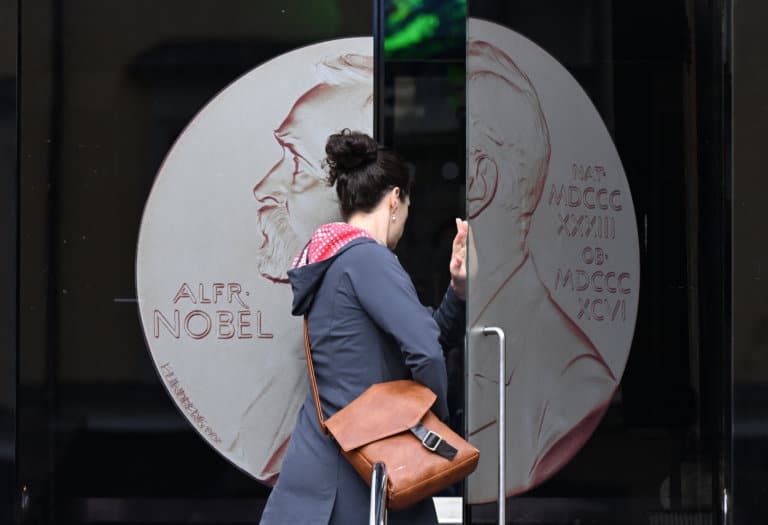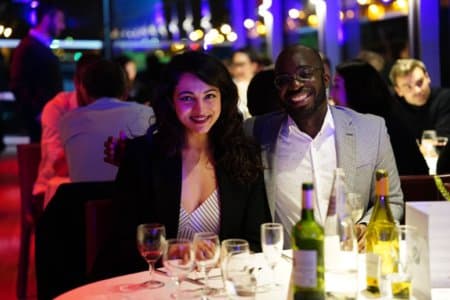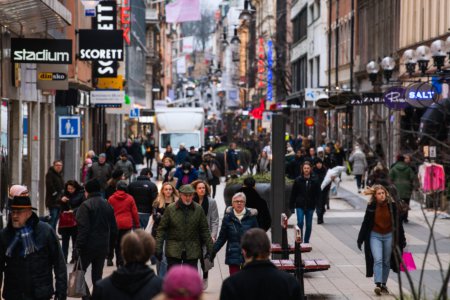
What do Albert Einstein, Marie Curie, Rabindranath Tagore and the World Food Programme (WFP) have in common?
They are all Nobel Prize winners.
For many, this prestigious award is a lifelong dream. For others, a welcome surprise.
Winners have come from all kinds of backgrounds; many are immigrants or even international students.
Announced annually since 1901, there are five disciplines for the prize: chemistry, physics, literature, peace, and physiology or medicine.
There is also an economics prize, but it is not technically a Nobel Prize.
While many of us know that the Nobel Prize 2023 winners have been announced, we’re still not quite sure how they were chosen.

The Nobel Prize 2023 was awarded in Norway, as in all other years. Source: AFP
How the Nobel Prize 2023 works
In September, the Norwegian Nobel Committee — a group of five appointed by the Norwegian parliament (Storting) to select the annual winners — invites more than 6,000 individuals to submit names.
These individuals include Novel laureates, holders of chairs in chosen prestigious universities, national governing body members, as well as noteworthy scientists or leaders in one of the categories.
You cannot nominate yourself.
Nominees can be submitted until Jan. 31, after which the Norwegian Nobel Committee narrows the list to about 350 names.
Then, by spring, it gets whittled down to just 15 names. These recommendations are then passed on to the prize-awarding institutions, who will determine the final selection.
Each institution is responsible for a specific category:
- Physics, chemistry and economics: Royal Swedish Academy of Sciences
- Physiology or Medicine: Karolinska Institute
- Literature: Swedish Academy
- Peace: Norwegian Nobel Committee
The winners are announced, and the awards ceremony is held in December.

Alfred Nobel wanted the prizes to be given to those who have done their best for humanity in the fields of physics, chemistry, physiology or medicine, literature and peace. Source: AFP
We know the Nobel Prize 2023 winners, but who is Nobel?
Born on Oct. 21, 1833 in Stockholm, Sweden, Alfred Nobel was the kind of multi-hyphenate who dabbled in many areas.
He was an inventor, entrepreneur, scientist and businessman. He also wrote poetry and plays.
Growing up, his father was an engineer and inventor, but his business suffered losses, and he decided to move to Russia. When he became successful, he sent for his family to move too.
In St. Petersburg, private tutors gave Nobel and his three brothers a first-class education. They covered natural sciences, languages and literature.
By 17, Novel could speak and write in Swedish, Russian, French, English and German.
As his father was displeased at his interest in poetry, he sent Nobel to become a chemical engineer.
Nobel worked in the private laboratory of Professor T. J. Pelouze, a famous chemist.
He also met Italian chemist Ascanio Sobrero, who invented nitroglycerine, a highly explosive liquid, three years earlier.
Fast forward to 1863, Nobel returned to Sweden. He focused on developing nitroglycerine as an explosive. Unfortunately, many died during his experiments, including his younger brother.
The government then banned experiments within the Stockholm city limits.
In 1866, however, is experiments paid off, and Nobel got a patent on what he named dynamite. He is also the mastermind behind a detonator or blasting cap, which could be set off by lighting a fuse.
Nobel died in 1896, and his last will and testament dedicated his fortune — left 31 million Swedish Kronas, about US$265 million dollars today — to give prizes to those who have done their best for humanity in the fields of physics, chemistry, physiology or medicine, literature and peace.
It took four years for the executors to realise his wishes, but in 1901, the first Nobel Prizes were awarded.
Prizes have been bestowed on winners every year since then.
Nobel Prize 2023: How do you win one?
A paper by Philip E. Bourne, founding editor-in-chief of PLOS Computational Biology in the National Library of Medicine, outlines the 10 steps you need to take to win a Nobel Prize:
- Never start your career by aiming for a Nobel Prize
- Hope that your experiments fail occasionally
- Collaborate with other scientists, but never with more than two other people
- To increase your odds of winning, be sure to pick your family carefully (a cheeky nudge at how seven children of Nobel Prize winners have gone on to win the Prize themselves)
- Work in the laboratory of a previous Nobel Prize winner
- Even better than rule 5, try to work in the laboratory of a future Nobel Prize winner
- Always design and execute your best experiments at a time when your luck is running high
- Never plan your life around winning a Nobel Prize
- Always be nice to Swedish scientists
- Study biology
While some of these tips sound sarcastic or seem impossible, don’t give up just yet because there is still hope.
Check out the BBC’s stats based on past winners, which include percentages based on age, university gender and more.
The above study found that only three universities – Harvard, Cambridge and Columbia – have had Nobel Prize winners in all six categories.
If you want to increase your chances, look at the education of the Nobel Prize 2023 winners and see if you can emulate their success.

French experimental physicist and Emeritus professor at Ohio State University, Pierre Agostini, won the Nobel Prize 2023 for Physics. Source: AFP
Nobel Prize 2023: Follow in the educational footsteps of the winners
The Nobel Prize 2023 was awardedto 11 people for their exceptional contributions that have significantly benefited humanity.
1. The Nobel Prize 2023 – Physics
- Pierre Agostini
Pierre Agostini, a French experimental physicist and Emeritus professor at Ohio State University, is celebrated for his groundbreaking contributions to strong-field laser physics and attosecond science.
His journey began in Tunis, a French protectorate, but his academic pursuits led him to various places.
He pursued physics at the Université Aix-Marseille in Marseille, France, earning his undergraduate degree in 1961, followed by a master’s in advanced studies in 1962, and ultimately a doctorate in 1968.
His professional career started at the Centre d’Études de Saclay, where he held various roles, from researcher to the institution’s research director.
- Ferenc Krausz
Ferenc Krausz, a physicist with Hungarian and Austrian roots, is renowned for his work in attosecond science.
He holds the director position at the Max Planck Institute of Quantum Optics and is a professor of experimental physics at the Ludwig Maximilian University of Munich in Germany.
Krausz began his academic journey by studying theoretical physics at Eötvös Loránd University in Budapest from 1981 to 1985.
Simultaneously, he delved into electrical engineering at the Budapest University of Technology and Economics.
During this period, he began his research at the BME Institute of Physics, spending three years in the university’s laser laboratory.
In 1991, he earned a laser physics doctorate from the Vienna University of Technology, followed by a postdoctoral habilitation degree in 1993.
His association with the Vienna University of Technology began in 1987, eventually leading to his appointment as a full professor in 1999.
He took on the director role at the Max Planck Institute for Quantum Optics in Garching in 2003.
One year later, he became the chair of experimental physics at the Ludwig Maximilians University in Munich.
- Anne L’Huillier
Anne L’Huillier, a French-Swedish physicist and professor at Lund University in Sweden, has earned several prestigious physics awards, including the Wolf Prize in Physics in 2022.
Her educational journey began in 1980 when she obtained a bachelor’s degree in mathematics from École Normale Supérieure in Fontenay-aux-Roses.
She then pursued a graduate degree in theoretical physics and mathematics at the Pierre and Marie Curie University in Paris.
Later, she secured a permanent position at the Commissariat à l’Énergie Atomique (CEA).
In her postdoctoral years, L’Huillier held positions at institutions like the Chalmers Institute of Technology in Gothenburg, Sweden, and the University of Southern California in Los Angeles.
Eventually, in 1995, she joined Lund University in Sweden as an associate professor and became a full-fledged physics professor two years later.

The Nobel Prize 2023 winners for chemistry are Moungi G. Bawendi, Louis E. Brus and Alexei I. Ekimov. Source: AFP
2. The Nobel Prize 2023 – Chemistry
- Moungi G. Bawendi
Moungi Gabriel Bawendi is a chemist with American, Tunisian, and French roots.
He currently holds the prestigious position of Lester Wolfe Professor at the Massachusetts Institute of Technology (MIT).
Growing up, Bawendi had quite an international upbringing. His father, the renowned mathematician Mohammed Salah Baouendi, moved their family to the US when Bawendi was a child to take up a mathematics teaching post at Purdue University in Indiana.
Bawendi earned a bachelor’s degree in 1982 and a master’s in 1983 from Harvard University.
He furthered his studies at the University of Chicago, receiving a PhD in 1988.
After that, he conducted postdoctoral research at Bell Laboratories under the mentorship of Louis E. Brus, focusing on topics like photo-physics and materials synthesis.
In 1990, Bawendi joined MIT. Over the years, he rose through the ranks and became a full professor in chemistry in 1996.
- Louis E. Brus
Louis E. Brus grew up with a passion for chemistry and physics.
He enrolled at Rice University with a scholarship that required him to participate in Naval Reserve Officers Training Corps (NROTC) activities.
He then pursued a PhD at Columbia University, focusing on the photodissociation of sodium iodide vapour under the guidance of Richard Bersohn.
Brus completed his doctorate in 1969 and returned to the US Navy as a lieutenant. During his service, he worked as a scientific staff officer at the US Naval Research Laboratory in Washington, D.C.
Based on Bersohn’s recommendation, Brus eventually left the Navy and joined AT&T Bell Laboratories in 1973. At Bell Labs, he made a groundbreaking discovery, unravelling the world of quantum dots.
In 1996, he became part of the faculty in the Department of Chemistry at Columbia University, where he continues to make significant contributions to the field of chemistry.
- Alexei I. Ekimov
Alexei Ivanovich Ekimov, a Russian physicist, has made significant contributions to the field of nanomaterials. His journey in this fascinating field began in the Soviet Union.
In 1967, Ekimov earned his bachelor’s degree in physics from Leningrad State University, now known as St. Petersburg University.
He furthered his education by obtaining a PhD in physics in 1974 at the Ioffe Physical-Technical Institute of the Russian Academy of Sciences.
Following his academic pursuits, Ekimov researched at the Vavilov State Optical Institute in Leningrad.
Since 1999, Ekimov has been living and working in the US, contributing to nanotechnology as a scientist for Nanocrystals Technology, a company based in New York State.

Katalin Kariko completed her BSc degree in biology in 1978 and her PhD in biochemistry in 1982. Source: AFP
3. The Nobel Prize 2023 – Physiology or Medicine
- Katalin Karikó
Katalin Karikó is a Hungarian-American biochemist with a remarkable journey. She was born in Szolnok, Hungary, and grew up in a small village called Kisújszállás.
Her family had a modest life without running water, a refrigerator or a TV. Her father was a butcher, and her mother worked as a bookkeeper.
Karikó showed a strong interest in science from a young age, earning third place in a biology competition in Hungary during her primary education.
After completing her BSc degree in biology in 1978 and her PhD in biochemistry in 1982 at the University of Szeged, she conducted research in Hungary.
However, her lab lost its funding in 1985, and she sought opportunities abroad. Eventually, she moved to the US and joined Temple University as a postdoctoral researcher.
At the University of Pennsylvania, working with American cardiologist Elliot Barnathan, she made a groundbreaking discovery: they found that mRNA, a molecule similar to DNA, could be used to instruct cells to produce specific proteins.
This finding opened the door to mRNA-based gene therapy, a field with huge potential for treating diseases by providing the body with instructions to make the necessary proteins.
- Drew Weissman
Drew Weissman is an American physician and immunologist who has made significant contributions to the field of RNA biology.
After high school, he pursued his academic journey. He earned a bachelor’s and master’s degree from Brandeis University in 1981, where he focused on biochemistry and enzymology.
His education continued at Boston University, where he obtained an MD and a PhD in immunology and microbiology in 1987.
Weissman completed a medical residency at Beth Israel Deaconess Medical Center in Boston following his academic pursuits.
He later embarked on a fellowship at the National Institutes of Health (NIH) in Maryland, where he worked under the guidance of renowned immunologist Anthony Fauci.

Jon Fosse’s books are on display after he was announced the winner of the 2023 Nobel Prize in Literature at the Swedish Academy. Source: AFP
4. The Nobel Prize 2023 – Literature
- Jon Fosse
Jon Fosse is a Norwegian author, translator, and playwright.
After graduating from high school in 1979, Fosse relocated to Bergen, where he started working for the Gula Tidend newspaper.
In the 1980s, he pursued his education at the University of Bergen, completing a master’s degree in comparative literature in 1987.
While at the University of Bergen, Fosse began writing in Nynorsk, one of Norway’s written languages.
He published more works, including “Closed Guitar” in 1985 and a poetic cycle titled “Angel with Water in Its Eyes” in 1986.

Narges Mohammadi strongly advocates for human and women’s rights, speaking out against oppression and injustice in Iran. Source: AFP
5. The Nobel Peace Prize 2023
- Narges Mohammadi
Narges Mohammadi, an Iranian human rights activist and Nobel laureate, has had a life full of challenges and determination.
Born in Zanjan, Iran, in 1972, she grew up in various places, including Qorveh, Karaj, and Oshnaviyeh.
Mohammadi pursued her education at Imam Khomeini International University, where she studied physics and eventually became a professional engineer.
During her university years, she wrote articles supporting women’s rights and was actively involved in the political student group “Enlightened Student Group.”
Mohammadi then became a journalist for several reformist newspapers and authored a book of political essays called “The Reforms, the Strategy, and the Tactics.”
In 2003, she took a significant step by joining the Defenders of Human Rights Center (DHRC), an organisation led by Nobel Peace Prize laureate Shirin Ebadi. Over time, Narges became the vice president of DHRC.
Throughout her life, she has strongly advocated for human and women’s rights, speaking out against oppression and injustice in Iran.
Her dedication to these causes earned her a Nobel Peace Prize in 2023. Despite facing imprisonment and adversity, she continues to fight for the freedom and rights of all.

Claudia Goldin attended Cornell University and then pursued a PhD in economics at the University of Chicago. Source: AFP
6. The Sveriges Riksbank Prize in Economic Sciences in Memory of Alfred Nobel 2023
- Claudia Goldin
Claudia Goldin, an American economic historian and labour economist, has significantly contributed to economics and economic history.
She initially aspired to become an archaeologist but changed her path after being captivated by microbiology during high school.
She attended Cornell University with plans to study microbiology, but her interests shifted.
Goldin then pursued a PhD in economics at the University of Chicago.
Her PhD dissertation explored slavery in antebellum US cities and southern industry, leading to her doctorate in industrial organisation and labour economics in 1972.
Throughout her career, Goldin has been a prominent figure in the field of economics, with a particular focus on women’s work, the gender pay gap, income inequality, technology’s impact, education, and immigration.
Her extensive research has influenced the understanding of women’s roles in economic development.
In 1990, she made history as the first woman to achieve a tenured professorship in economics at Harvard University.
Currently, she holds the prestigious position of Henry Lee Professor of Economics at Harvard and actively contributes to the National Bureau of Economic Research’s (NBER) Gender in the Economy group.










